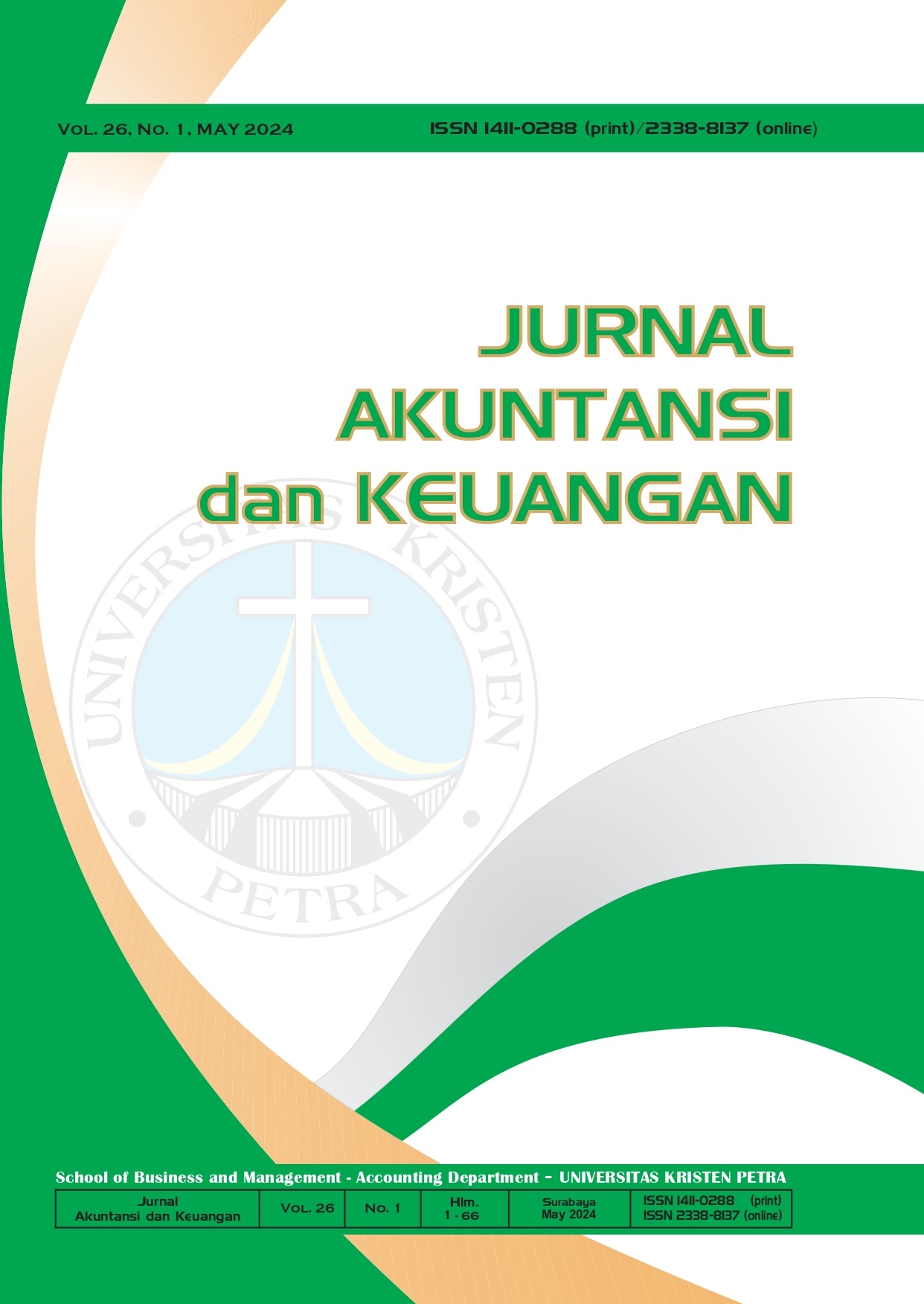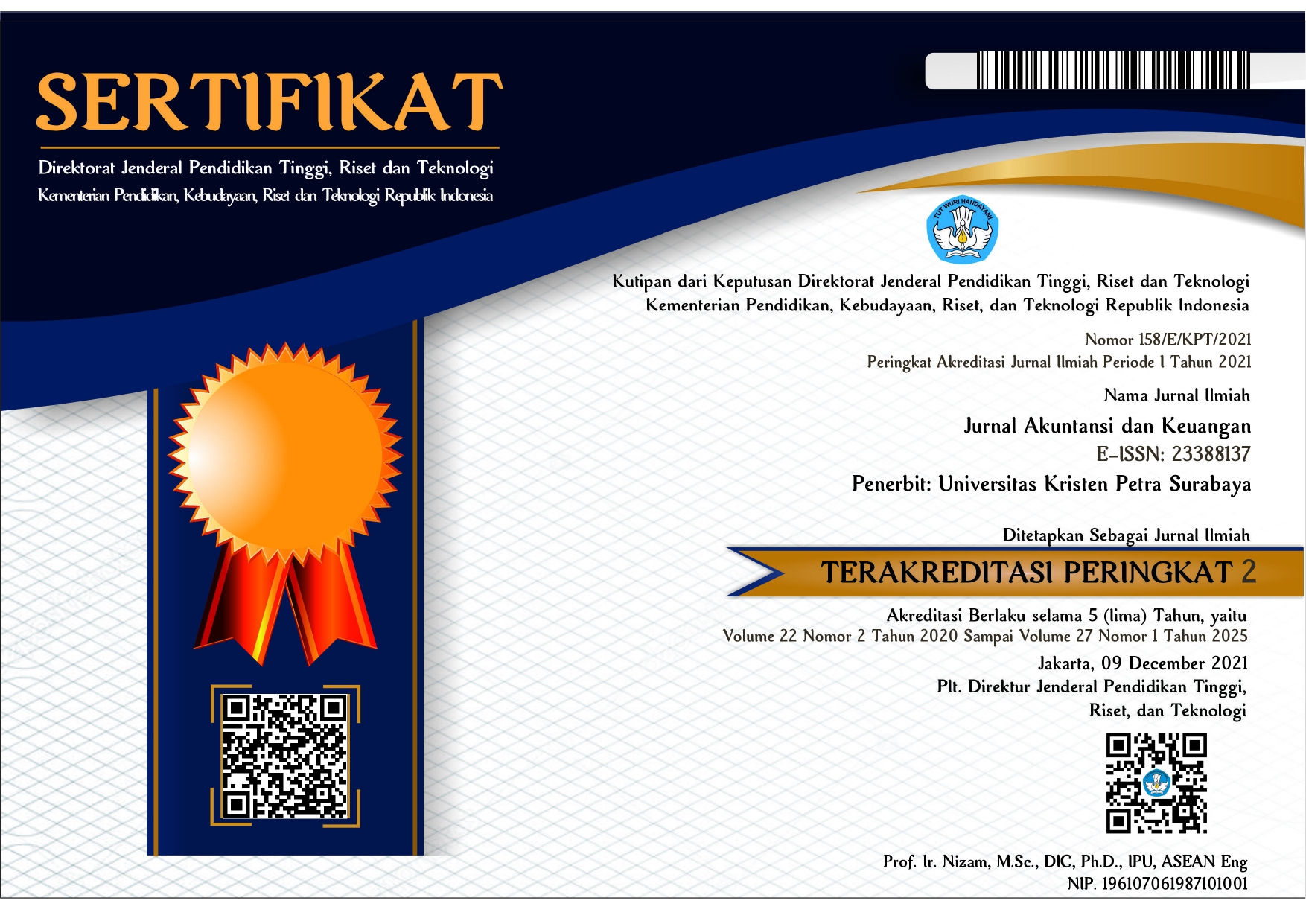Strengthening Corporate Cash Holdings and Investment Efficiency in the COVID-19 Pandemic: Some Empirical Evidence from Indonesia Emerging Markets
DOI:
https://doi.org/10.9744/jak.26.1.35-46Keywords:
Cash holding, investment efficiency, covid-19, sustainability reporting disclosure, governanceAbstract
This study explores the connection between the amount of cash a company holds and its effectiveness in making investments, as well as the effect of the COVID-19 pandemic. The researchers analyzed a dataset consisting of 2721 observations from Indonesian publicly listed firms between 2013 and 2020, excluding the financial industry (SIC 6). They utilized multiple linear regression analysis to investigate how cash holding influences investment efficiency and how the COVID-19 pandemic affects this relationship. The research approach employed was quantitative. The results indicate that a higher cash holding has a negative impact on investment efficiency. The uncertainty caused by the COVID-19 outbreak has significantly affected corporate cash flows, impeding business activities. Additionally, robustness tests were conducted to address concerns regarding potential bias, and the results consistently aligned with the ordinary least squares (OLS) estimation. These findings are significant for investors, potential investors, and management, providing insights into the interplay among cash holding, investment efficiency, and the COVID-19 Pandemic.
References
Abed, I. A., Hussin, N., Ali, M. A., Haddad, H., Shehadeh, M., & Hasan, E. F. (2022). Creative accounting determinants and financial reporting quality: a systematic literature review. Risks, 10(4), 76.
Ahiadorme, J. W., Gyeke-Dako, A., & Abor, J. Y. (2018). Debt holdings and investment cash flow sensitivity of listed firms. International Journal of Emerging Markets, 13(5), 943–958. https://doi.org/10.1108/IJoEM-04-2017-0126
Aksar, M., Hassan, S., Kayani, M., Khan, S., & Ahmed, T. (2022). Cash holding and invest¬ment efficiency nexus for financially distressed firms: The moderating role of corporate gover¬nance. Management Science Letters, 12(1), 67–74.
Alkhataybeh, A., AlSmadi, S. A., Shakhatreh, M. Z., & Khataybeh, M. A. (2022). Government ownership and corporate cash holdings: Em¬pirical evidence from the amman stock exchange. Sustainability (Switzerland), 14(18), 1–14. https://doi.org/10.3390/su141811168
Alnori, F., & Bugshan, A. (2022). Cash holdings and firm performance: an empirical analysis from Shariah-compliant and con¬ventional corporations. International Journal of Islamic and Middle Eastern Finance and Management, 16(3), 498–515. https://doi.org/10.1108/IMEFM-01-2022-0005
Amess, K., Banerji, S., & Lampousis, A. (2015). Corporate cash holdings: Causes and consequences. International Review of Financial Analysis, 42(8), 421–433. https://doi.org/10.1016/j.irfa.2015.09.007
Anagnostopoulou, S. C., Trigeorgis, L., & Tsekrekos, A. E. (2023). Enhancement in a firm's information environment via options trading and the efficiency of corporate investment. Journal of Banking & Finance, 149(2), 106809.
Arianpoor, A., & Mehrfard, N. (2022). The impact of managerial attributes on cash holding and investment efficiency and the mediator role of cash holding. Journal of Islamic Accounting and Business Research, 14(4), 233-246. https://doi.org/10.1108/JIABR-02-2022-0046
Arslan-Ayaydin, Ö., Florackis, C., & Ozkan, A. (2014). Financial flexibility, corporate investment and performance: evidence from financial crises. Review of Quantitative Finance and Accounting, 42(2), 211–250.
Batuman, B., Yildiz, Y., & Karan, M. B. (2022). The impact of the global financial crisis on corporate cash holdings: Evidence from Eastern European countries. Borsa Istanbul Review, 22(4), 678-687.
Benlemlih, M., & Bitar, M. (2018). Corporate social responsibility and investment efficiency. Journal of Business Ethics, 148(3), 647–671.
Bhuiyan, M. B. U., & Hooks, J. (2019). Cash holding and over-investment behaviour in firms with problem directors. International Review of Economics & Finance, 61(12), 35–51.
Bhutta, U. S., Tariq, A., Farrukh, M., Raza, A., & Iqbal, M. K. (2022). Green bonds for sustainable development: Review of literature on development and impact of green bonds. Technological Forecasting and Social Change, 175(12), 121378.
Brahmana, R. K., & Kontesa, M. (2023). Sea surface temperature anomalies and cash holdings: Evidence from fisheries companies. Marine Policy, 148(7), 105452. https://doi.org/10.1016/j.marpol.2022.105452
Branzei, R., Ferrari, G., Fragnelli, V., & Tijs, S. (2002). Two approaches to the problem of sharing delay costs. Annals of Operations Research, 109(1), 359–374.
Cahyono, S., Fernando, H. A., & Primasatya, R. D. (2023a). The nexus between corporate financial ratio and price earnings performance : evidence from president election period in Indonesia. Jurnal Akuntansi Keuangan Petra, 25(2), 101–116.
Cahyono, S., Haider, I., & Sawarjuwono, T. (2023b). A new paradigm of Luca Pacioli’s bookkeeping on blockchain phenomenon. Jurnal Akuntansi Aktual, 10(1), 52. https://doi.org/10.17977/um004v10i12023p052
Chang, C. C., & Yang, H. (2022). The role of cash holdings during financial crises. Pacific Basin Finance Journal, 72(13), 101733. https://doi.org/10.1016/j.pacfin.2022.101733
Chen, W., Liu, X., & Hong, Y. (2023). Two heads better than one? Strategic alliance and firms' excess cash holdings. Finance Research Letters, 52(8), 103575. https://doi.org/10.1016/j.frl.2022.103575
Chun-ai, M. A. (2010). Design and empirical analysis of corporate financial flexibility index. Systems Engineering, 28(10), 61–66.
Deng, L., & Zhao, Y. (2022). Investment lag, financial constraints and company value—evidence from China. Emerging Markets Finance and Trade, 58(11), 3034–3047.
DeFond, M. L., Lim, C. Y., & Zang, Y. (2016). Client conservatism and auditor-client con¬tracting. The Accounting Review, 91(1), 69–98.
Duong, H. N., Nguyen, J. H., Nguyen, M., & Rhee, S. G. (2020). Navigating through economic policy uncertainty: The role of corporate cash holdings. Journal of Corporate Finance, 62(12), 101607.
Falato, A., Goldstein, I., & Hortaçsu, A. (2021). Financial fragility in the COVID-19 crisis: The case of investment funds in corporate bond markets. Journal of Monetary Economics, 123(13), 35–52.
Goodell, J. W., Goyal, A., & Urquhart, A. (2021). Uncertainty of uncertainty and firm cash holdings. Journal of Financial Stability, 56(8), 100922. https://doi.org/10.1016/j.jfs.2021. 100922
Goodell, J. W., Kumar, S., Lim, W. M., & Pattnaik, D. (2021). Artificial intelligence and machine learning in finance: Identifying foundations, themes, and research clusters from bibliometric analysis. Journal of Behavioral and Experimental Finance, 32(6), 100577.
Guizani, M., & Abdalkrim, G. (2022). Board gender diversity, financial decisions and free cash flow: empirical evidence from Malaysia. Management Research Review, 45(2), 198-216.
Graham, J. R. (2022). Presidential address: Corporate finance and reality. The Journal of Finance, 77(4), 1975-2049.
Huang, K. (2020). Management forecast errors and corporate investment efficiency, Journal of Contemporary Accounting and Economics, 16(3), 100208 doi: 10.1016/j.jcae.2020.100208.
Harris, C., & Li, Z. (2021). Negative operating cash flows and investment inefficiency. Managerial Finance, 47(10), 1408–1427.
He, Z., & Wintoki, M. B. (2016). The cost of innovation: R&D and high cash holdings in U.S. firms. Journal of Corporate Finance, 41 (4), 280–303. https://doi.org/10.1016/j.jcorpfin.2016.10.006
Huang, K. (2020). Management forecast errors and corporate investment efficiency. Journal of Contemporary Accounting & Economics, 16(3), 100208.
Huo, X., & Qiu, Z. (2020). How does China’s stock market react to the announcement of the COVID-19 pandemic lockdown? Economic and Political Studies, 8(4), 436–461.
Liu, G., Zhang, L., & Xie, Z. (2022). Environ¬mental taxes and corporate cash holdings: Evidence from China. Pacific Basin Finance Journal, 76(8), 101888. https://doi.org/10.1016/j.pacfin.2022.101888
Lee, C. C., Wang, C. W., & Thinh, B. T. (2023). Green development, climate risks, and cash flow: International evidence. Pacific Basin Finance Journal, 79(3), 102021. https://doi.org/10.1016/j.pacfin.2023.102021
Lei, X. T., Xu, Q. Y., & Jin, C. Z. (2022). Nature of property right and the motives for holding cash: Empirical evidence from Chinese listed companies. Managerial and Decision Eco¬nomics, 43(5), 1482-1500.
Jiang, J., Hou, J., Wang, C., & Liu, H. (2021). COVID-19 impact on firm investment—Evidence from Chinese publicly listed firms. Journal of Asian Economics, 75(11), 101320.
Jones, E., Li, H., & Adamolekun, O. (2022). Excess cash holdings, stock returns, and investment organicity: Evidence from U.K. investment announcements. Abacus, 58(4), 603–647. https://doi.org/10.1111/abac.12275
Kent, T., & Driver, C. (2020). Leverage, uncertainty and investment decisions. Economics Letters, 190(7), 109052.
Khan, S. U. (2022). Financing constraints and firm-level responses to the COVID-19 Pandemic: International evidence. Research in international business and finance, 59(4), 101545.
Li, C., Yang, Y., & Ren, L. (2020). Genetic evolution analysis of 2019 novel coronavirus and coronavirus from other species. Infection, Genetics and Evolution, 82(7), 104285.
Li, Z., Crook, J., Andreeva, G., & Tang, Y. (2021). Predicting the risk of financial distress using corporate governance measures. Pacific-Basin Finance Journal, 68(9), 101334.
Matejić, T., Knežević, S., Arsić, V. B., Obradović, T., Milojević, S., Adamović, M., ... & Špiler, M. (2022). Assessing the Impact of the COVID-19 Crisis on Hotel Industry Bankruptcy Risk through Novel Forecasting Models. Sustainability, 14(8), 4680.
Moin, A., Guney, Y., & El Kalak, I. (2020). The effects of ownership structure, sub-optimal cash holdings and investment inefficiency on dividend policy: evidence from Indonesia. In Review of Quantitative Finance and Accounting, 55(3), 857-900 Springer US. https://doi.org/10.1007/s11156-019-00862-z
Phan, H. V, Nguyen, N. H., Nguyen, H. T., & Hegde, S. (2019). Policy uncertainty and firm cash holdings. Journal of Business Research, 95(5), 71–82.
Probowulan, D. (2022). The Sustainability of Pervasive Learning in Accounting Education: Strategy in the Transition of “Merdeka Belajar-Kampus Merdeka”. Jurnal Akuntansi dan Keuangan, 24(1), 24-33.
Qu, X., Percy, M., Hu, F., & Stewart, J. (2022). Can CEO equity‐based compensation limit investment‐related agency problems?. Accounting & Finance, 62(2), 2579–2614.
Quah, H., Haman, J., & Naidu, D. (2021). The effect of stock liquidity on investment efficiency under financing constraints and asymmetric information: Evidence from the United States. Accounting & Finance, 61(7), 2109–2150.
Ramadhan, P., Rani, P., & Wahyuni, E. S. (2023). Disclosure of carbon emissions, covid-19, green innovations, financial performance, and firm value. Jurnal Akuntansi dan Keuangan, 25(1), 1–16. https://doi.org/10.9744/jak.25.1.1-16
Roychowdhury, S., Shroff, N., & Verdi, R. S. (2019). The effects of financial reporting and disclosure on corporate investment: A review. Journal of Accounting and Economics, 68(2-3), 101246.
Sheu, H., & Lee, S. (2012). Excess cash holdings and investment: the moderating roles of financial constraints and managerial en¬trenchment. Accounting & Finance, 52(6), 287–310.
Sun, Q., Yung, K., & Rahman, H. (2012). Earnings quality and corporate cash holdings. Accounting & Finance, 52(2), 543–571.
Sikveland, M., Xie, J., & Zhang, D. (2022). Determinants of capital structure in the hospitality industry: Impact of clustering and seasonality on debt and liquidity. International Journal of Hospitality Management, 102(8), 103172.
Soesanto, S., & Wijaya, H. (2022). The Effect of Readability of annual reports and value relevance of financial information on agency costs with analyst coverage as moderating variable. Jurnal Akuntansi dan Keuangan, 24(1), 46-56.
Tang, D. Y., & Zhang, Y. (2020). Do share¬holders benefit from green bonds?. Journal of Corporate Finance, 61(10), 101427.
Trinh, N. T., Nguyen, T. P. T., & Nghiem, S. H. (2022). Economic policy uncertainty and other determinants of corporate cash holdings of Australian energy companies. International Journal of Energy Sector Management, 16(6), 1192–1213. https://doi.org/10.1108/IJESM-10-2020-0005
Wu, Y., Lee, C. C., Lee, C. C., & Peng, D. (2022). Geographic proximity and corporate investment efficiency: evidence from high-speed rail construction in China. Journal of Banking & Finance, 140(3), 106510.
Yang, X., Han, L., Li, W., Yin, X., & Tian, L. (2017). Monetary policy, cash holding and corporate investment: Evidence from China. China Economic Review, 46(7), 110–122.
Yip, R. W., Young, D., Liu, B., & Wang, Z. (2022). Acquiring firms’ transparency and their returns around M&A announcements: Evidence from China. Journal of International Accounting, Auditing and Taxation, 48(9), 100487.
Zou, Y., Zhong, Z., & Luo, J. (2021). Ethnic diversity, investment efficiency, mediating roles of trust and agency cost. Economic Analysis and Policy, 69(3), 410–420.
Downloads
Published
How to Cite
Issue
Section
License
Authors who publish with this journal agree to the following terms:
- Authors retain the copyright and publishing right, and grant the journal right of first publication with the work simultaneously licensed under a Creative Commons Attribution License that allows others to share the work with an acknowledgement of the work's authorship and initial publication in this journal.
- Authors are able to enter into separate, additional contractual arrangements for the non-exclusive distribution of the journal's published version of the work (e.g., post it to an institutional repository or publish it in a book), with an acknowledgement of its initial publication in this journal.
- Authors are permitted and encouraged to post their work online (e.g., in institutional repositories or on their website) followingthe publication of the article, as it can lead to productive exchanges, as well as earlier and greater citation of published work (See The Effect of Open Access).<a href="http://creativecommons.org/lice















